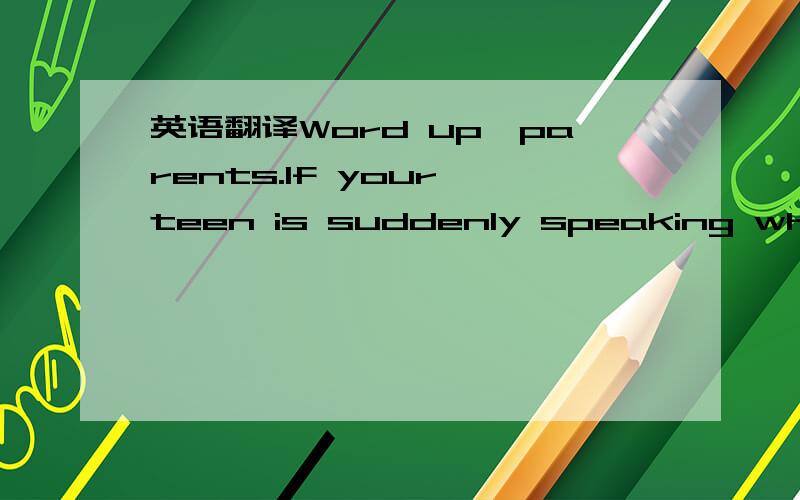英语翻译Word up,parents.If your teen is suddenly speaking what seems like an entirely new language,don’t worry.Slang is just a part of growing up,says Connie Eble,an English professor at University of North Carolina and the author of “Slang &
来源:学生作业帮助网 编辑:作业帮 时间:2024/04/27 17:05:05

英语翻译Word up,parents.If your teen is suddenly speaking what seems like an entirely new language,don’t worry.Slang is just a part of growing up,says Connie Eble,an English professor at University of North Carolina and the author of “Slang &
英语翻译
Word up,parents.If your teen is suddenly speaking what seems like an entirely new language,don’t worry.
Slang is just a part of growing up,says Connie Eble,an English professor at University of North Carolina and the author of “Slang & Sociability.”
“It’s part of this whole range of behaviors that they are trying on,” she said,comparing the use of slang to clothing.“You try it on,and you take it off,and most of it you don’t keep very long.”
Teenagers of every generation have used slang to stand out,yet still be like other people their age,says Kathleen Waldron,a professor in the College of Human Services at Arizona State University’s West Campus and an expert on adolescence.
It’s wise for parents to be familiar with their lingo,Eble and Waldron say.
“You should try to know it,so when you hear them talking ...you think it’s innocent,but it’s really about a drug deal,” Waldron said.
It may also keep you from panicking.For example,when your child says something is a “dime,” that’s a 10 on a scale of 1 to 10,not a “dime bag” of pot like when you werea kid.
Oh,and don’t use your teen’sslang yourself,she cautions parents.
“Their children’s slang belongsto their children,not to them.Donot try to use this slang becauseit just makes you look silly,” Eble said.Besides,it’s hard to keep up.
“Awesome” is out,but “cool” is still “money.” A teacher who was “da bomb” isnow “tight.”
英语翻译Word up,parents.If your teen is suddenly speaking what seems like an entirely new language,don’t worry.Slang is just a part of growing up,says Connie Eble,an English professor at University of North Carolina and the author of “Slang &
新词涌现,家长们,如果你的孩子突然说出一种类似全新的语言,你并不用太担心.
《俚语和社交性》的作者、北卡罗莱纳大学英语教授Connie Eble说,俚语只是语言发展的一部分.
她说,“这是正在进行的一系列行为现象的一部分,”她把俚语比作衣服 “你把它穿上,又把它脱下,而且大部分的你不会穿很长时间.”
美国亚利桑那州立大学西校区人类服务学院教授和青少年专家凯瑟琳沃尔德伦说,每一代青少年仍然像其他年代的人一样,能很好地使用俚语.
Eble和沃尔德伦说,父母熟悉他们的行话是明智之举.
沃尔德伦说,“你应该试着去了解它,因此当你听到他们的谈话……你认为它是合法的,但它的的确确是一个毒品交易.
“它也可以让你免致恐慌.例如,当你的孩子说“一分钱”的时候,是指1到10的范围,而不是当你是孩子的时候认为的“一锅硬币袋”.
哦,她提醒父母不要用你青少年时代的俚语.
Eble说,“孩子的俚语属于孩子们,而不是家长.不要尝试使用那些俚语,因为那只会让你看起来很傻.此外,你也很难跟上.
“真棒”已经落伍了,但“酷”还是“钱”(正流行).老师是“大炸弹”现在正“紧”.(这些俚语正流行)